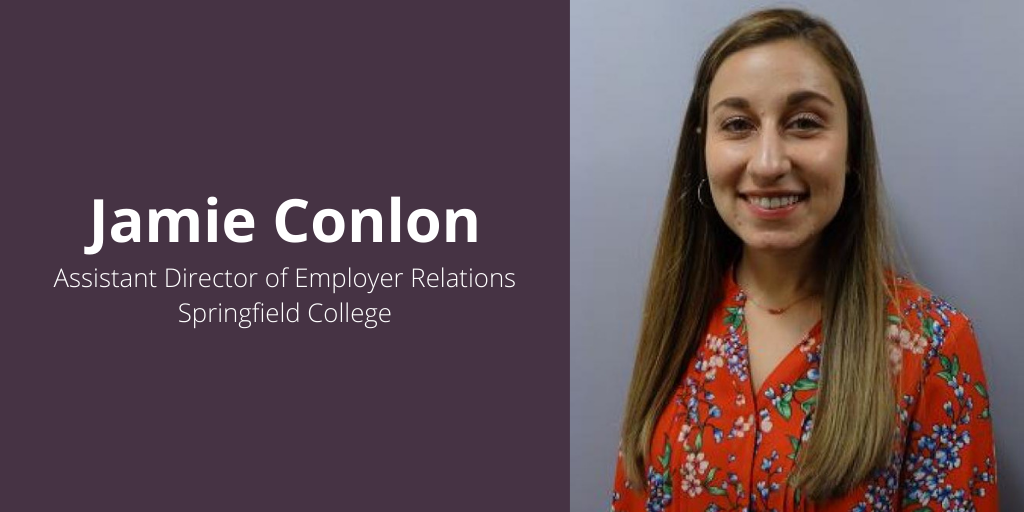Navigating the logistics of hosting a career fair in the midst of a pandemic can feel like a maze with no end.
This career fair season will be the first time that many institutions host their fairs virtually.
So, I consulted Jamie Conlon, Assistant Director of Employer Relations at Springfield College. We talked about how she moved Springfield’s career fair online, helping students find fulfilling careers in an economy defined by COVID-19.

I hope you’ll find her tips and advice applicable, even inspiring, for your own virtual career fair.
To say Springfield College’s Career team loves career fairs would be an understatement.
Each spring, they host several specialized fairs related to academic majors and courses. Each fall, they hold a massive face-paced, energetic fair that includes employers related to every major offered at the institution. And each winter, they team up with eight local institutions, taking turns hosting the College Career Centers of Western Massachusetts mega career fair.
In the past, these events have been held in person. But this year, Jamie and her teammates were faced with a difficult choice: Cancel the career fairs or alter them to an online format. They chose the latter.
Here are the top five steps that Jamie found essential to the planning process.
5 Tips
1. Research, research, research
She couldn’t stress enough how paramount it is to properly research and prepare. Investigate the following questions:
What digital platforms are out there?
-
- What do they cost? Do they require a contract? Do they offer a free trial?
- How many students will they accommodate? Which platforms are most accessible to students with disabilities, including hearing and visual impairments?
- How user-friendly is each platform? Do they offer support services for day-of glitches? Will you need to extensively train students, staff, and employers on how to use it?
- What kind of assessment metrics does each platform offer, if any?
What have other campuses utilized?
-
- What platforms does your institution currently subscribe to or have a contract with?
- What are peet institutions using for their own career fairs?
What are the pros saying?
-
- Jamie recommends attending webinars (she found great info through Firsthand’s recent webinar), conference sessions, and even demos offered by tech companies.

2. Give yourself plenty of time to prepare
Jamie has learned that planning a virtual conference will take more time and energy than you may initially plan for. That’s because:
- There is a lot that goes into selecting the right platform for your campus. It is vital to not rush through this step.
- Familiarising yourself with the platform may also be a challenge as you explore key features, navigation, and hold practice runs. Jamie emphasizes that you’ll need to learn the platform well so you can answer questions live during the event.
- There will then be a learning curve for everyone involved who is not already familiar with the platform — including career counselors, support staff, faculty, students, and employers.
3. Create content
Marketing and communication materials will be vital to the success of your virtual career fair.
- A fair of this format may feel strange to your students. So, publicize it widely through social media, email newsletters, the career center webpage, flyers, and more just as you would for an on-campus fair — but times 10 in order to get the word out to virtual students and all students who are likely spending much less time in the campus union this semester.
- Include links to demos and career-sponsored workshops so that students can test out the platform and get comfortable with it before they log on to the real event.
- Encourage students and employers to build their profiles early. Many platforms let users add pictures, resumes, and biographies to start the conversation and get connected with students or employers early.
4. Have a trial run
Hosting a practice run with your team will be essential for ensuring that your platform fits your needs and goals.
- Practice utilizing features such as screen sharing, profile building, document uploading, waiting rooms, and breakout rooms.
- Identify what could go wrong. Ask volunteers for feedback on anything that confused them, resulted in technical difficulties, or wasn’t user-friendly.
- As a bonus, host a trial run for eager or anxious students to meet with a career counselor via the same platform. You could offer resume reviews, cover letter critiques, or mock interviews.
5. Communicate with everyone
Now that you’ve got your platform selected and marketing content created, be sure to communicate how the fair will run.
- Jamie recommends asking faculty to pitch your career fair to their students during the first or last five minutes of class. Nudge faculty, specifically within higher-level major-specific courses, to encourage their students to attend the career fair and discuss career fair strategies.
- Garner feedback on the fair. Some platforms allow users to collect participant data during or after it. You can also use survey tools such as Presence’s Digital Form Builder to access what worked well and what didn’t.
Potential Challenges
Jamie helped me identify some glitches, issues, and bugs that could happen along the way.
- Technical difficulties: Communicating with your IT department and the platform’s customer support team is key. Notifying both groups of when the fair will be occurring will help them prepare to troubleshoot.
- Issues of accessibility: Whether you have a student with hearing impairments or without reliable internet access, be prepared to answer these concerns.
- No-shows: Many platforms allow students to reserve time slots with employers. However, the student may still not show up, taking a limited spot away from other students. To hopefully prevent (or at least limit) this, Jamie recommends opening student sign ups for the career fair no more than a month prior so that students will have a concrete plan of their career goals and what their schedule will look like that day.
We know that planning a career fair during a global pandemic isn’t ideal.
But with resourcefulness, communication, and sparks of creativity, you can build a stellar virtual career fair for your students and alumni.
Virtual career fairs are heading towards the norm.They benefit students by connecting them with employers whom they may previously not have sought out. This can lead to more job matching and informal one-on-one interviews.
For more tips on addressing students’ career concerns in a positive, growth-focused way, check out 3 Ways to Empower Students in Their Career Paths Despite the Uncertain Future.
What additional advice do you have regarding student career development during the pandemic? Connect with us on Twitter @themoderncampus.

Special thank you and shout out to Jamie Conlon for letting me interview her for this piece! Jamie is truly an inspiration in her passion for working with students through tough career choices. She has been a supportive friend since my first day of grad school at Springfield College.





